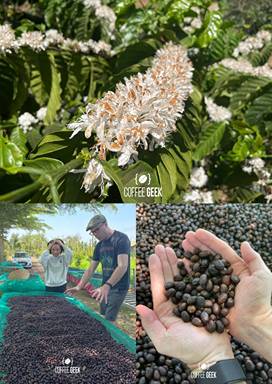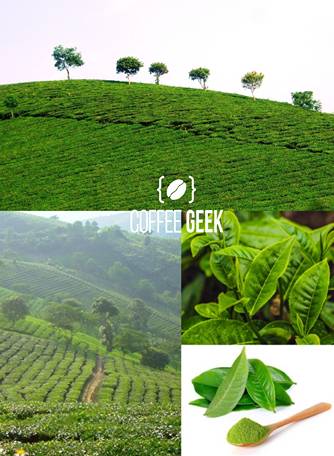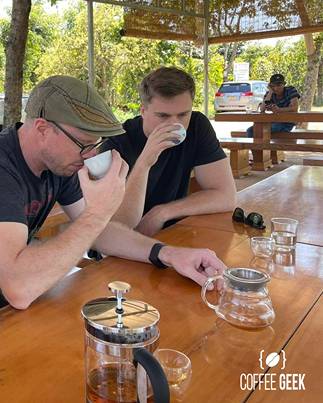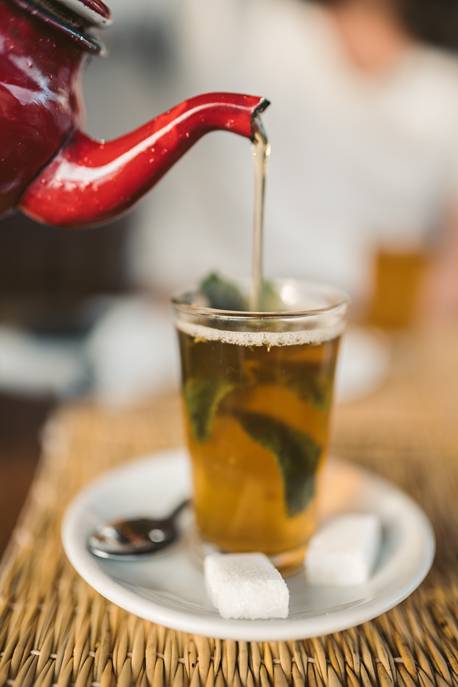Beverages like coffee and tea have long been enjoyed by people all around the world, often being compared due to their shared caffeine content and stimulating effects.
However, there has always been a debate surrounding the question: is coffee technically tea?
This question may seem trivial at first, but it serves as a gateway to uncovering the fascinating distinctions and similarities between these two beloved drinks.
To answer this question, we need to define what constitutes a “tea.” Traditionally, tea refers to a beverage made by steeping the processed leaves of the Camellia Sinensis plant in hot water.
By this definition, coffee is not a tea, as it is made from brewing the ground beans of the Coffea plant, rather than the leaves of the Camellia Sinensis tea plant.
However, if we expand the definition of tea to include any infusion-based beverage, coffee could arguably be considered a cousin to tea.

It’s important to note that while coffee may share some similarities with tea, there are also considerable differences in taste, caffeine content, and brewing methods.
Furthermore, coffee leaf tea, which is derived from coffee plant leaves, is still not considered a true tea. Instead, it is classified as a “tisane” alongside herbal infusions like rooibos and chamomile source.
So, while the topic of whether coffee is technically a tea is an intriguing one, it’s clear that these two beverages stand distinct from one another, each offering their own unique characteristics and experiences to those who enjoy them.
Defining Coffee and Tea
Coffee Basics
Coffee, a popular beverage known for its caffeine content, comes from the seeds of the coffee plant.
These seeds, commonly referred to as beans, grow inside the plant’s fruits, which are often called cherries.
Coffee plants thrive in tropical regions that provide ideal climate conditions for their cultivation.
The harvested beans are then roasted to various degrees, contributing to the rich flavors and aromas characteristic of coffee.
Some key aspects of coffee making include brewing methods, which can range from simple processes like infusion to more advanced techniques, such as using an espresso machine.
Levels of caffeine and taste in coffee vary, depending on factors like brewing method and bean type.
Tea Basics
Tea, on the other hand, is a beverage made from the leaves of the Camellia sinensis tea plant.
This versatile plant produces various tea types, such as black, green, oolong, and white, each with different caffeine levels and flavors.
Generally, tea leaves undergo a process of drying, oxidation, and fermentation before they reach consumers.
In addition to traditional teas, there’s a wide array of herbal teas, which originate from other plant species.
Herbal tea often consists of dried fruits, flowers, seeds, or roots, all of which can confer distinctive flavors and potential health benefits.
To clarify the differences between coffee and tea:
- Coffee originates from beans, while teas comes from leaves.
- Coffee comes from the coffee plant, whereas tea comes from the Camellia sinensis tea plant.
- Herbal tea is made from various herbs and does not contain Camellias sinensis leaves.
- Coffee generally contains more caffeine than tea, though the caffeine content in real tea varies depending on the tea type.
Although coffee can sometimes be considered tea in terms of its brewing method, its origin from beans and the unique features of the coffee plant distinguish it from tea.
Brewing Processes
Making Coffee
Coffee brewing involves several key steps, including roasting, grinding, and extraction. Each step plays a significant role in determining the final taste and aroma of the brewed coffee.
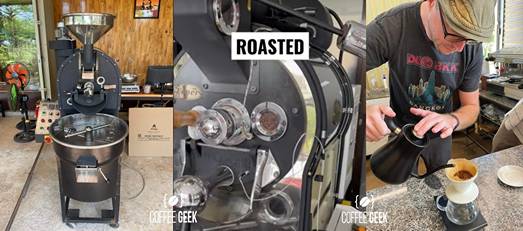
- Roasting: Coffee beans are typically roasted to transform their chemical and physical properties, resulting in the beans’ signature flavor and aroma profiles. Coffee beans’ roasting levels range from light to dark, which can affect coffee’s taste, acidity, and body.
- Grinding: After roasting, coffee beans need to be ground to a specific size for proper extraction. The grind size is determined by the brewing method used, with coarser grinds for methods like the French press and finer grinds for espresso.
- Extraction: During extraction, hot water is used to dissolve and extract the soluble compounds from the ground coffee beans. Variables like water temperature, brewing time, and coffee-to-water ratio play crucial roles in the extraction process. Different brewing methods in coffee consumption, such as espresso, pour-over, or cold brew, result in varying extraction rates and flavors.
Making Tea
Tea brewing also involves a series of steps that include steeping and infusion to create a flavorful and aromatic beverage.
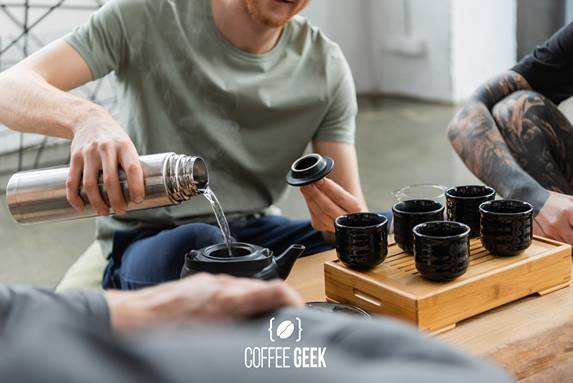
- Steeping: In the process of making tea, add hot water over the tea leaves, allowing the soluble compounds to dissolve and infuse into the hot water. The steeping time varies depending on the type of tea, with delicate teas like green and white requiring shorter brewing times, while robust teas like black tea and oolong require longer steeping.
- Infusion: The infusion in tea brewing is the resulting liquid obtained from steeping the tea leaves. During this process, key components like essential oils, polyphenols, and caffeine are extracted, contributing to the flavor, aroma, and potential health benefits of the tea. The water temperature, steeping time, and tea-to-water ratio all influence the infusion’s final taste and quality.
While coffee and tea brewing processes share similarities, like extraction and infusion, they differ in other aspects, such as roasting and grinding for coffee and steeping time for tea.
Understanding these differences allows one to appreciate the complexities and nuances of each beverage.
Taste and Preferences
When it comes to the world of beverages, drinking coffee, and tea are undoubtedly some of the most popular choices. Both offer unique tastes, and individual preferences can be influenced by various factors.
In this section, we will explore the taste and preferences related to coffee and tea, including the role of sugar.
Drinking coffee is known for its rich, bold flavors and is derived from roasted coffee beans.
With the variety of roasting methods, coffee lovers can enjoy a wide range of taste profiles, from light to dark and everything in between.
Some people appreciate the bitterness and robustness that coffee offers, while others prefer adding sugar to balance out the flavors.
The caffeine content in coffee is also a significant factor for many drinkers, providing a quick energy boost and increased alertness.
Tea, on the other hand, covers a broad spectrum of flavors due to the diverse range of tea leaves and processing methods.
Black, green, and white teas are some common types of tea that offer distinct tastes.
Tea drinkers often enjoy the lighter, more subtle flavors that tea provides compared to coffee.
Some prefer their tea with sugar, while others appreciate the natural taste without any sweeteners.
The preference for coffee or tea may also be influenced by genetics, where certain individuals have an increased sensitivity to bitter flavors, such as caffeine.
This sensitivity can contribute to the individual’s preference for one over the other.
In summary, taste and preferences for coffee and tea can vary significantly among individuals, and factors such as sugar and genetic sensitivity play a role.
The popularity of these beverages is undeniable, and their unique flavors cater to a wide range of personal preferences.
Health Benefits and Risks
Caffeine Content
Both coffee and tea contain caffeine, but their amounts vary significantly. When you drink coffee usually has a higher caffeine content, averaging at 92 milligrams per cup, while tea’s caffeine content depends on the type and can range from 20-60 milligrams per cup.
Caffeine can have both positive and negative effects on the body. Moderate caffeine consumption may enhance athletic performance, increase alertness, and improve cognitive function.
However, excessive caffeine intake can lead to increased blood pressure, anxiety, and sleep disturbances.
Antioxidants and Other Compounds
Both coffee and tea are rich in antioxidants that contribute to their potential health benefits. Antioxidants help protect the body from damage caused by free radicals, which can lead to chronic diseases and aging.
Coffee has been associated with a lower risk of type 2 diabetes, heart disease, and certain cancers, while tea consumption is linked to better cardiovascular health, lower inflammation levels, and a reduced risk of developing chronic disease, as mentioned in this Harvard study.
However, it’s important to note that the health effects can vary depending on individual factors, as well as the type and preparation of the beverage.
Herbal Teas and Alternatives
Herbal teas, which technically are not “teas” but rather infusions made from various herbs, offer their own set of health benefits. Some popular herbal tea includes chamomile, ginger, and peppermint.
- Chamomile: Known for its calming effects, chamomile tea may help with anxiety, sleep, and digestion.
- Ginger: This invigorating tea can aid in digestion, reduce nausea, and has anti-inflammatory properties.
- Peppermint: Often used to soothe stomach issues and freshen breath, peppermint tea also boasts antioxidant properties.
Herbal tea generally do not contain caffeine, making them a great alternative for those who wish to avoid or minimize caffeine intake.
However, it’s essential to consider possible allergies and interactions with medications when incorporating herbal tea into one’s diet.
In conclusion, coffee and tea have distinct health benefits and risks associated with their consumption. The choice between them largely depends on personal preferences and individual health factors.
Conclusion – Is Coffee Technically Tea?
In summary, while coffee and tea share some similarities, they are fundamentally different beverages. Coffee is not considered tea, as it comes from a different plant and has its own unique preparation methods.
However, if one refers to tea as a beverage made through the process of infusion, coffee might be considered a type of tea depending on the brew method used.
Tea is typically derived from the Camellia Sinensis plant, whereas coffee comes from the seeds of coffee plants. The flavors, aromas, and health benefits of these two beverages also vary.
For example, coffee leaf tea, made from boiling coffee leaves, more closely resembles green tea in taste and is sweeter and earthier.
When it comes to caffeine content, both beverages provide varying amounts depending on the type of tea or coffee being consumed.
Tea generally contains an amino acid called L-theanine that helps calm and relax the body, while caffeine in coffee stimulates the nervous system, heart, and muscles.
As a result, people often turn to coffee for an energy boost and tea for relaxation or soothing benefits.
In conclusion, the distinctions between coffee and tea are clear, both in their origins and their properties. It is essential for consumers to understand these differences when choosing between the two beverages to best serve their needs and preferences.
FAQs
Is coffee also a tea?
No, coffee is not technically considered a tea as it is made from roasted coffee beans while tea is made from the leaves of the Camellia sinensis plant.
Can coffee be considered a substitute for tea?
While coffee and tea both contain caffeine and are popular beverages, they have different flavors and properties. Some people may enjoy both coffee and tea, while others may prefer one over the other. Ultimately, it depends on personal preference.
Can coffee be brewed like tea?
While coffee and tea are brewed with hot water, they require different brewing methods and equipment. Coffee is typically brewed through a drip or espresso machine, while tea is often brewed using a teapot or infuser.
What is technically a tea?
Technically, tea refers to a beverage made from the leaves of the Camellia sinensis plant, which includes black tea, green tea, white tea, and oolong tea. However, herbal teas made from other plants are also commonly referred to as teas.
Is coffee more popular than tea?
In some parts of the world, such as the United States, coffee is more popular than tea. However, in other parts of the world, such as China and Japan, tea is more popular. It ultimately depends on cultural preferences and traditions.
Does coffee have health benefits like tea?
Yes, coffee has been associated with several health benefits, including a lower risk of type 2 diabetes, Parkinson’s disease, and liver cancer. However, it is important to consume coffee in moderation and not rely on it as a sole source of health benefits.


